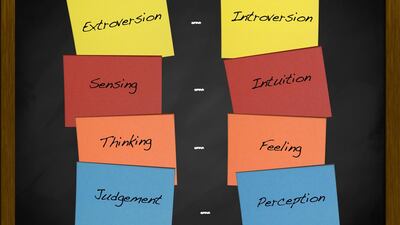My name is Saeed, and I am an ESTP. Wait, I should say that's what I am right now. It's the middle of the afternoon and I have consumed three coffees, which makes me gregarious, active and extroverted.
However, earlier this morning I was definitely an ISFP; quiet, laid-back and a tad regretful for staying up late last night to watch that Jean-Claude Van Damme movie.
The point I'm trying to make is that, like measuring your blood pressure throughout the day, a personality test is often not an accurate representation of who you are. At best, it can only provide a passable glimpse of your habits and train of thought at a particular time.
Yet it is alarming how much weight is placed on personality tests when it comes to reading people and recruiting them, both here and across the globe.
To make matters worse, researchers in the United States this week suggested we do away with the existing signifiers and instead put everyone into one of four personality types: "average," "reserved," "role-model" and "self-centred".
To me, such definitions are so obtuse and vague that any of us could fit into these descriptions. I fell into the personality-test rabbit hole when I first arrived in Abu Dhabi several years ago. I was feeling out of sorts, and despite knowing the language and customs reasonably well, I still found it difficult to not just meet people but also sustain a friendship.
It was at the suggestion of my learned friend, a counsellor, that I get myself a life coach.
First order of business was a two-hour personality test. It was “top of the line and super accurate” and consisted of nearly 200 questions.
I paid Dh400 for the privilege, and believe me, it is time I will never get back. It only took 15 minutes for my eyes to glaze over as I had to grade statements in terms of honesty, such as "I like to know the who, what and when of things?" or "I feel like I'm more laid-back than energetic."
I scored well on communication and I had some “woo” in me, meaning that I tend to be more agreeable than most. But, no matter how much I tried, I couldn’t internalise the assessment results and they only left me more confused.
It could have been worse – I could have ended up like my former Abu Dhabi neighbour, let's call him Ahmed, who sat a personality test for a financial company in Dubai. He didn't get the job and his recruiting agent said it was because the test and subsequent panellists branded him "surly". As a result of their summation he plunged into an existential crisis. He found himself researching different synonyms for surliness (ranging from "glum" and "morose" to "dour"), and, I am afraid to say, his usual benign demeanour changed, dare I say, towards "surly".
The ironic thing about all of this is that personality tests are meant to make our lives easier and risk free, but for me they just make things more complicated.
Learning about oneself is an ongoing education – it is meant to be a work in progress without the shortcuts. So if you are ISFP or ESTP or downright surly, go easy on yourself as you are you and will evolve as you’re meant to. And if you decide to take a personality test, just know it is more a weather report than the map of who you are.
________________________
Read more from Saeed:
The discriminating job advert got me thinking
Halal dumplings? Elusive in London or Sydney, but easy to find in Abu Dhabi
Abu Dhabi is a calm place to de-stress from the bustle of daily life
What I learnt on Hajj: it’s no picnic, but then it was never meant to be
A ‘majaal’ moment as the buffer zone came to an end
Domestic workers who take care of our families and homes are 'silent heroes'
________________________


